
A Comparison of
Edgar Allen Poe's "The Raven" and
Nathaniel Hawthorne's "Young Goodman Brown"
The Raven is most likely Edgar Allan Poe's most widely read poem; his opening lines "Once upon a midnight dreary," and the Raven's own "Nevermore" as well known as Shakespeare's "To be or not to be;" Poe's "jingle meter" as memorable to us as Homer's verse was in ancient times. And yet, although images of Poe sitting at his desk, reading over a book of "old and forgotten lore," and the ominous shadow of the raven looming over him at the end come immediately to mind with the mere mention of the title, what is the poem about?
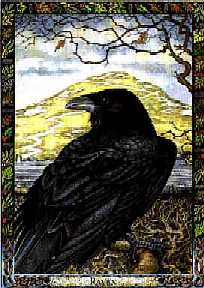 To take it at its purely chronological, surface level, we begin verse by verse. The narrator (presumably, but not necessarily the author) is reading ancient texts, when something taps on his door. He pauses to explain that the reason he has been pouring over forgotten books is because his love, Lenore, is dead. The tapping thrills the narrator with the anticipation of terror, although he verbally assures himself that the tapping is coming from a non-supernatural force. Upon opening the door, he encounters "darkness there and nothing more." He stares at the darkness for a time, and whispers "Lenore;" the word is echoed back. Returning to his chamber, the tapping resumes, this time from the window. The narrator opens the window and a raven steps in, and perches atop a bust of Pallas. When asked for his name, the raven answers: "Nevermore." The narrator wonders at the bird, but steeped in melancholia, as he is, assumes that this visitor (like all his others) will also leave him. The raven answers: "Nevermore." At this, the narrator is startled out of his own depression, and speculates that the bird might have had a cruel master who taught it this sole word. Fascinated, he pulls a chair before the bird and leans on a velvet cushion. So doing, he remembers Lenore. Starting up, he questions the bird, demanding a respite, "nepenthe" from his memories of Lenore, then whether or not there even is a "balm in Gilead," and finally demanding to know if he will ever embrace Lenore again, in "the distant Aidenn." Quoth the raven to all these questions: "Nevermore." The narrator curses the Raven, ordering it out of his heart and room. But the raven, "never flitting, still is sitting, still is sitting" on the bust, casting a shadow over the narrator from which his soul will be lifted "nevermore (Poe 1688-1691)."
To take it at its purely chronological, surface level, we begin verse by verse. The narrator (presumably, but not necessarily the author) is reading ancient texts, when something taps on his door. He pauses to explain that the reason he has been pouring over forgotten books is because his love, Lenore, is dead. The tapping thrills the narrator with the anticipation of terror, although he verbally assures himself that the tapping is coming from a non-supernatural force. Upon opening the door, he encounters "darkness there and nothing more." He stares at the darkness for a time, and whispers "Lenore;" the word is echoed back. Returning to his chamber, the tapping resumes, this time from the window. The narrator opens the window and a raven steps in, and perches atop a bust of Pallas. When asked for his name, the raven answers: "Nevermore." The narrator wonders at the bird, but steeped in melancholia, as he is, assumes that this visitor (like all his others) will also leave him. The raven answers: "Nevermore." At this, the narrator is startled out of his own depression, and speculates that the bird might have had a cruel master who taught it this sole word. Fascinated, he pulls a chair before the bird and leans on a velvet cushion. So doing, he remembers Lenore. Starting up, he questions the bird, demanding a respite, "nepenthe" from his memories of Lenore, then whether or not there even is a "balm in Gilead," and finally demanding to know if he will ever embrace Lenore again, in "the distant Aidenn." Quoth the raven to all these questions: "Nevermore." The narrator curses the Raven, ordering it out of his heart and room. But the raven, "never flitting, still is sitting, still is sitting" on the bust, casting a shadow over the narrator from which his soul will be lifted "nevermore (Poe 1688-1691)."
As the precursor to the French Symbolists (1574), Poe's literary works, especially The Raven, can be read in a multitude of ways: for example, the raven could be a symbol of his lost love, or of melancholia, or of death, or any number of other things. Likewise, one might go through the tapping, or the bust, or the velvet and find veiled meanings within them, some possibly related to his own life (i.e., the death of his young wife, or his own tendency towards broodishness), and others superceding his own life experience to exemplify the universal (i.e., death or love). Or, wrapping all these together, The Raven may be viewed as a sort of American Divine Comedy, much like its prose counterpart, Young Goodman Brown by Nathaniel Hawthorne.
The American version of the soul's journey in the afterlife is decidedly more pessimistic than the original Divine Comedy, which merely began in Hell, but only as a necessary means of purgation en route towards Heaven. The American view seems to be that one can never climb up the devil's hoary legs to even achieve Purgatory, and that Heaven is some far-distant place where Beatrice's descendents, Lenore and Faith, live in blissful oblivion and indifference to the horrific state of the narrator. The guide, in Americana, is not the benevolent poet Virgil, but either a mythic raven or the devil himself. And the conclusion is either eternal oppression or eternal pessimism. After such conclusion, the succeeding question must be why?
Why is American literature in depicting the soul's journey so dark? Why did each author write what he did? What in his life prompted him to conclude that the soul's end is so bleak? From the biographical analysis, some light may be shed.
Poe's life was riddled with disappointments and despondency. He was an alcoholic, and a genius; an unsuccessful editor, a successful author; an orphaned son of actors, although never officially a son to the man who raised him; a libertine, yet a young widower and so on. The Raven was written two years before his wife's death, and three years into his wife's illness (tuberculosis). Death and horror were always a fascination for him ("Despair over the loss of one's beloved, revenge on one's enemies, and exaltation over the final unification of consciousness with the cosmos3/4these were the themes Poe worked over in these final pieces [1573]"), and he seems to have no firm religious affiliation to counterbalance this.
Hawthorne, on the other hand, lived a fairly normal life, attending college in Maine, and returning to Salem afterwards. He was a retiring man, given to introspection and wanderlust, who wrote often in spurts of creativity. He married a woman seven years younger than himself and died before her. Best known for depicting Puritan New England, he showed the world a "place of 'dark necessity'" under the technique of early expressionism, or as he described it: "where the Actual and the Imaginary might meet (1701)." This meeting of the Actual and the Imaginary he shares with Poe, but unlike the latter's personal demons of squalor and despair, Hawthorne felt keenly the burden of the Puritanical oppression3/4made the worse for both the shouldering of it and sharing in it.
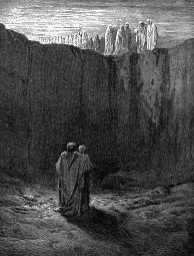 Poe's life and worldview were a thing of horror, as was Hawthorne's. The difference lies in their assignment of the horrific. Poe sees this as a supernatural, inexplicable reality, while Hawthorne attributes it to the Puritan way of life, as well as some supernatural force. Both have an estranged sense of God: Poe calls the bird both an angel and a fiend sent from some foreign god; Hawthorne barely mentions God in his works at all. The two authors seem to be striving towards Nietzsche's conclusion that "God is dead," and the Existentialist's amendment, "Life is absurd." Consequently there is no Heaven, nor even Purgatory, but only the Inferno both in life and in death. Perhaps, there might be some hope towards Schopenhauer's hazy afterlife which, if not perfect, is at least better than the present existence. The soul's journey, otherwise, is a circle: an endless repetition of "nevermore;" the constant companion of the devil and his touch.
Poe's life and worldview were a thing of horror, as was Hawthorne's. The difference lies in their assignment of the horrific. Poe sees this as a supernatural, inexplicable reality, while Hawthorne attributes it to the Puritan way of life, as well as some supernatural force. Both have an estranged sense of God: Poe calls the bird both an angel and a fiend sent from some foreign god; Hawthorne barely mentions God in his works at all. The two authors seem to be striving towards Nietzsche's conclusion that "God is dead," and the Existentialist's amendment, "Life is absurd." Consequently there is no Heaven, nor even Purgatory, but only the Inferno both in life and in death. Perhaps, there might be some hope towards Schopenhauer's hazy afterlife which, if not perfect, is at least better than the present existence. The soul's journey, otherwise, is a circle: an endless repetition of "nevermore;" the constant companion of the devil and his touch.
Is this not the American belief? Is not the cause of the "me" generation (and those generations preceding and succeeding it) just this belief in the horror of today, and the "nevermore" of the afterlife? Is it not vital to live for "the pursuit of happiness" today, since tomorrow may bring a raven "tapping at my chamber door?" Is not our "Faith" brought before the altar of the devil, and thus seen drab in daily life? Poe and Hawthorne, each in their own way, have given a fair view of the American mindset as it exists today. What is needed is that return to those volumes of "forgotten lore," to the full Divine Comedy, to the Bible itself, and a "Faith" tied more firmly about our hearts than by dainty pink ribbons.
 Top Top
|

|  |
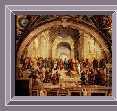 |
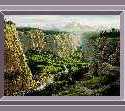 |
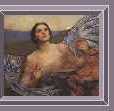 |
 (c) 1998
(c) 1998
Updated 13 June, 2000
All Rights Held by the Author.
No part of these pages may be used or copied without express permission of the author.